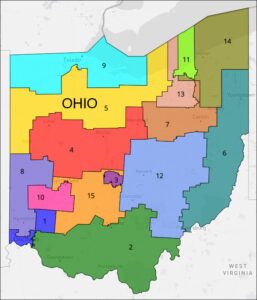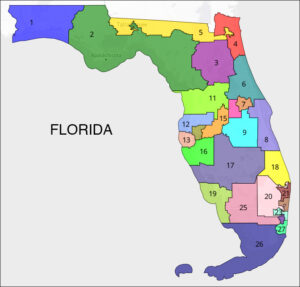By Jim Ellis
March 31, 2022 — Two long awaited key redistricting situations became clearer Tuesday, as the important electoral states of Ohio and Florida took action. While the Ohio congressional plan may finally be set for this election, the Sunshine State map, while still not close to finalization, is trending toward resolution.
Ohio

Click on map or here to go to: Interactive Ohio Congressional Redistricting map.
Last week, the high court, from which people were waiting for a new decision over the congressional map before them for several weeks, surprised the Democratic plaintiffs by informing them that they would have to file a new lawsuit. The justices explained that they had already issued a final ruling on the first map, hence the process would have to begin again with this second installment.
It now appears that the legislature-passed congressional map currently before the court will be used for the 2022 election. The briefing schedule was set for the new lawsuit, but the submission deadline is two months beyond the state’s May 3 primary. Therefore, the new congressional map looks to remain in place for 2022.
The new map would create a swing open 13th District south and east of Cleveland that would likely have been where Rep. Tim Ryan (D-Warren/Youngstown) would have run for re-election had he stayed in the House. On this map, the other member not seeking re-election, Rep. Anthony Gonzalez (R-Rocky River), would have been paired with GOP Rep. Bob Gibbs (R-Lakeville) in a new strongly Republican 7th District that encompasses the western Cleveland suburbs.
The two incumbents in the most competitive situations are Reps. Steve Chabot (R-Cincinnati) and Marcy Kaptur (D-Toledo) who both will face electorates favoring Democrats.
The lawsuit against the congressional map could well move forward during the latter part of this year, but any changes resulting from related legal action would likely mean a new draw for the 2024 election. After a string of favorable congressional map court rulings for Democrats, the lack of further judicial action in Ohio looks to benefit the Republicans, at least for the short term.
Ohio candidate filing under the map in question occurred earlier in the year. As mentioned above, the May 3 state primary will now feature the congressional elections, but not races for the state legislature due to court decisions. Nominations in these latter campaigns will be determined in a yet-to-be-scheduled second primary.
Florida

Click on map or here to go to: Interactive Florida Congressional Redistricting map.
The legislative leaders will not attempt to override the governor’s veto and instead proceed to a special redistricting session to occur during the April 19-22 period.
Under the legislature’s vetoed plan, Republicans would likely have increased their share of the Florida delegation from the current 16R-11D division to 18R-10D when including the new seat that the state earned through national reapportionment. The map Gov. DeSantis favors could push the GOP total higher.
The Florida plan is now the Republicans’ most important because it is likely the only place where they can gain more than one seat through redistricting.
With the court decision in North Carolina going against them, a swing of five seats in that state alone could occur. Examining the Republican draw, the GOP could have gained as many as three seats in the Tar Heel delegation. Under the court map, it’s possible that Democrats will now gain two. Therefore, a favorable Florida resolution becomes critical for Republican national electoral prospects.
The Florida candidate filing deadline is scheduled for June 17 for the associated Aug. 23 primary election.
